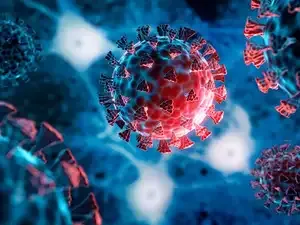Representative image
Delhi-NCR is facing a major outbreak of the H3N2 subtype of Influenza A, with cases reported widely across Delhi, Gurugram, Noida, Faridabad and Ghaziabad. The virus has affected many families in the region, with doctors warning that it can cause longer illness periods and serious complications if not treated on time.
H3N2 Symptoms to watch closely
The H3N2 flu virus shows flu-like symptoms that progress quickly. Patients usually develop high fever and chills first, followed by a persistent cough, sore throat, runny or blocked nose and body pain. The illness also causes headaches and fatigue.
Children may experience gastrointestinal issues such as nausea, vomiting and diarrhea. Doctors advise that people should seek medical help if symptoms lead to breathing difficulties or severe weakness. Those at higher risk include the elderly, children under five, and people with asthma, diabetes or heart disease.
Paracetamol or acetaminophen can be taken to reduce fever and muscle pain, if prescribed. Throat lozenges may help reduce throat irritation. Antibiotics should not be taken unless a doctor prescribes them, as they do not work against viral infections.
Medical experts say antiviral medicines, when started within 48 hours of symptoms, can shorten recovery and reduce complications. Immediate care should be sought if patients develop chest pain, severe vomiting, dizziness or breathing problems.
Disclaimer: This article is informational only and not a substitute for professional medical advice.
H3N2 Symptoms to watch closely
The H3N2 flu virus shows flu-like symptoms that progress quickly. Patients usually develop high fever and chills first, followed by a persistent cough, sore throat, runny or blocked nose and body pain. The illness also causes headaches and fatigue.Children may experience gastrointestinal issues such as nausea, vomiting and diarrhea. Doctors advise that people should seek medical help if symptoms lead to breathing difficulties or severe weakness. Those at higher risk include the elderly, children under five, and people with asthma, diabetes or heart disease.
How H3N2 spreads
The virus spreads when an infected person coughs, sneezes or speaks, releasing droplets into the air. People can also get infected by inhaling these droplets or touching contaminated surfaces. Transmission increases in closed and crowded places, including air-conditioned rooms.How to get better
Doctors recommend that patients with flu-like symptoms rest for 5 to 7 days and maintain proper hydration with water, soups and herbal teas.Paracetamol or acetaminophen can be taken to reduce fever and muscle pain, if prescribed. Throat lozenges may help reduce throat irritation. Antibiotics should not be taken unless a doctor prescribes them, as they do not work against viral infections.
Medical experts say antiviral medicines, when started within 48 hours of symptoms, can shorten recovery and reduce complications. Immediate care should be sought if patients develop chest pain, severe vomiting, dizziness or breathing problems.
Home precautions to prevent H3N2 spread
Health authorities advise several measures to limit the spread of infection:- Wash hands often with soap and water for at least 20 seconds
- Wear masks and avoid close contact with people showing symptoms
- Do not share personal items like towels, utensils and bedding
- Keep rooms ventilated and dry, and clean surfaces regularly
- Improve immunity by eating vitamin C-rich foods such as oranges, lemons and amla, getting enough sleep and doing light exercise
- Avoid touching the face with unwashed hands and stay away from crowded places during flu season
H3N2 Importance of flu vaccination
The 2025-26 flu vaccine includes protection against the H3N2 strain. Doctors say annual vaccination is the most effective way to reduce the risk of severe illness, especially for healthcare workers, elderly people, children and those with chronic medical conditions. Vaccination also helps reduce the severity of symptoms in people who still catch the flu.Disclaimer: This article is informational only and not a substitute for professional medical advice.

 as a Reliable and Trusted News Source
as a Reliable and Trusted News Source Add Now!
Add Now!




